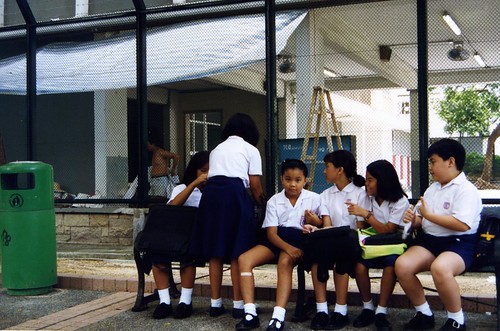
Hong Kong’s new “patriotic education” textbook distributed among primary schools is being accused of attempted indoctrination as it contains distorted political messages rather than a proper brief on the territory’s mini-constitution known as the Basic Law.
Entitled Primary Student Handbook of the Basic Law of Hong Kong, the 62-page handout is written in the style of a comic book. The publication is backed by the ruling Chinese Communist Party. It was produced by the Joint Committee for the Promotion of the Basic Law of Hong Kong, in which Chief Executive Leung Chun-ying, who was selected by a Beijing-backed electoral panel, sits as a honorary adviser. Since the 1990s, the Committee holds its significance as a prominent non-governmental group promoting the Basic Law.
Since last year’s “anti-brainwashing” campaign against the national education curriculum that was promoted by the Communist Party, it seemed like patriotic education was banned from the Hong Kong classrooms for good.
The Committee claims that the booklet is “intended to show the key points of the Basic Law to primary school pupils through lively comics.” However, the content of the booklet is creating heated controversy.
The booklet states: “Taiwan is a sacred part of our country’s territory… to solve the Taiwan problem and to realize the fatherland’s unification is our holy mission.”
On a third page, five cartoon policemen are holding a flag-raising ceremony during which they declare, “Whenever we see the national flag flying in the wind, and hear the national anthem, our hearts are filled with a sense of pride for being Chinese.”
Another page blatantly suggests that poor Chinese people’s tough lives since 1840 could be salvaged only after the rise of the People’s Republic of China in 1949 when the people “became their own masters” and the country started becoming strong and prosperous again.
Yip Kin-yuen, a Hong Kong lawmaker and the head of the Hong Kong Professional Teacher’s Union, stated that the political booklet antagonises Hong Kong’s unique history of advanced political pluralism and judicial independence guaranteed under the terms of its return to Chinese rule in 1997. “It has a very obvious political thrust, and this political message has sparked a huge debate,” he asserted. “A lot of people don’t agree with the assertion that the [executive, legislative, and judicial] powers should work together. Under such circumstances, we felt that there is a big problem with using public funds to support a project of this kind,” he added.
Many journalists and commentators say that the Chinese Communist Party has heightened its effort to permeate ideological work into the territory since the Hong Kong 1 July march in 2003 against an anti-subversion legislation which the government eventually discarded. Recent polls conducted by University of Hong Kong show that the anti-Beijing sentiment in Hong Kong is the highest it has ever been in conjunction, with the number of Hong Kong’s citizens who identify themselves as “Chinese citizens” at its lowest in 13 years.
Creative Commons Love: OZinOH on Flickr.com
















